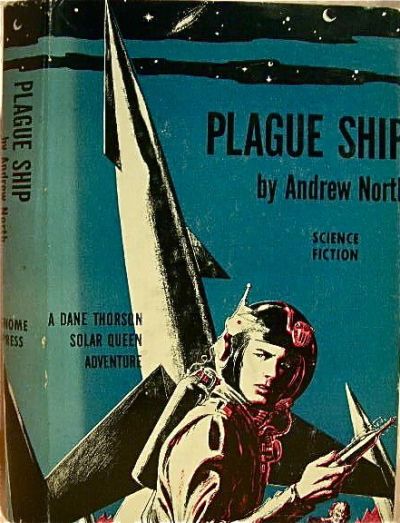But their adventures were only beginning
Plague Ship (Solar Queen, volume 2)
By Andre Norton

16 Jan, 2015
0 comments
1956’s Plague Ship returns to the adventures of the Free Trader Solar Queen in a little tale that illustrates the fundamental rule of the Solar Queen stories: Then Things Got Worse.
In the first novel, Solar Queen was forced by the Patrol to give up their trade rights with the planet Limbo. However, Captain Jellico managed to salvage something from that debacle: exclusive trading rights with the Salariki of Sargol. The Salariki are a race of warrior cats who can offer perfumes and rare gems to the skilled trader who manages to find a trade item that the Salariki want and that does not violate any of the Salariki taboos.
(The Salariki would probably love modern weapons, but this isn’t George R. R. Martin’s “Seven Times Never Kill Man” and Jellico isn’t a dick.)
The fly in the ointment for this trading expedition is the unexpected presence of an Inter-Solar trading vessel. While the Solar Queen has exclusive trading rights on their side, the IS ship has its own persuasive arguments, not limited by legality. IS wants Sargol’s gems; IS is very big and well-connected; IS might just decide to blow the Solar Queen into space-dust. After all, both ships are out in the deeps of space, where nobody else can snitch to the Patrol.
Happily, Jellico is more than able to run rings around the IS goons and it turns out that the Solar Queen does have something the aliens are quite eager to have: the small supply of catnip that the ship carries for the obligatory ship’s cat. Even better, it turns out catnip is not an addictive drug for the Salariki, which is good because the traders don’t establish that it isn’t until after one of the natives was exposed to the stuff. Everything is turning up roses for the crew of the Solar Queen!
Except …
After the Solar Queen leaves Sargol, the crew begins to fall ill one by one. That’s bad enough but they then discover that they have been designated a plague ship by the Patrol, which is presumably acting on information from those rascals on the IS ship (whose knowledge about the Solar Queen’s predicament suggests that they themselves orchestrated the illness). The Patrol takes a firm view on disease control and the treatment they prefer for plague ships is to drop them and their unlucky crews into a star. And the Patrol isn’t inclined to listen to protestations from crews claiming that the source of their malady isn’t a contagious disease but a previously unknown alien pest.
The crew of the Solar Queen is cool on the whole idea of being dropped into a star, but the alternative is a bold gambit that will see them hunted across the stars by the Patrol. The only possible refuge is the most hostile region on Earth, the radioactive Big Burn.
There are really two parts to this book: the trading expedition to Sargol and the plague story. While the second part is a competent enough example of the sort of story where the characters commit a string of lesser felonies to clear themselves from a greater charge (or in this case, escape summary execution), the trading expedition is more interesting; I can see the influence of earlier South Sea trading fiction on Norton’s depiction of the touchy Salariki, but the result is not purely derivative.
Once again, there’s really not much evidence to suggest that the humans of this era do not reproduce by asexual budding. There are no women of note in this novel.
In the previous book, it seemed that while the rules were stacked against Free Traders in favour of the big companies like Combine and IS, the Free Traders could still expect to grab a few crumbs now and then. In this book, it’s clear that IS, at least, isn’t happy to settle for winning most of the time; they cannot bear to leave even the scraps to the little guys like the Solar Queen. And while the Patrol may not be actively on IS’s side, they are all too willing to consign an innocent ship to stellar doom on the basis on some dubious information.
There are a couple of happy notes. The first is that this is an ongoing series, so the reader can be reasonably sure the Solar Queen will at least survive the adventure. The other is that the crew really are good at their jobs and even as each new contract turns sour, they find a way to salvage something out of their predicament. That would be fine except that Norton cheerfully ends the book on this note:
“Anyway we’re set in blessed and peaceful obscurity now. Thank the Spirit of Free Space there’s practically no trouble one can get into on a safe and sane mail route!”
But Cargo-master Van Rycke, in spite of knowing the Solar Queen and the temper of her crew, was exceedingly over-optimistic when he made that emphatic statement.
